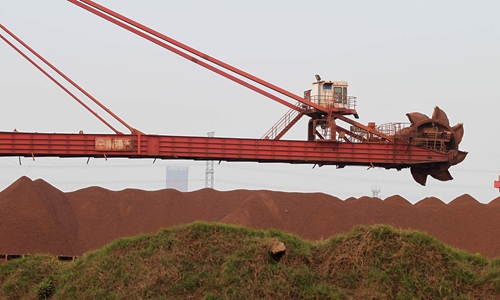Australia’s iron ore exports battered by epidemic: experts

Cranes load iron ore at a port in Nantong, East China's Jiangsu Province. File photo: VCG
Resources giants in Australia may take a hard hit from the outbreak of COVID-19 in the short run, experts cautioned on Monday, with some Australian companies warning that they will have to cut their annual revenue forecasts if the negative impact lingers.The impact on the Australian mining sector would be "extremely serious" at least in the first quarter, as China, the largest importer of many mineral products, has ceased production of many industries to contain the spread of the virus, experts said.
Australia-based resources company BHP said in a statement last week that "if the impact of COVID-19 lingers, and construction and manufacturing [in China] have not been able to return to regular operation in April, then we expect to revise our annual forecast lower. This would then flow directly through to lower commodity demand and price expectations."
According to BHP's financial report in 2019, China is the largest consumer of the company's commodities, accounting for over half of its sales. BHP's revenue in 2019 from its Chinese customers reached $24,274 million, up $1,614 million from the previous year. The company recorded a revenue income of $44,288 million that year.
The suspension of production in China affects not only Chinese companies but the whole global industrial chain, especially for industries that heavily depend on the Chinese market, Lin Boqiang, director of the China Center for Energy Economics Research at Xiamen University, told the Global Times.
China has strived to resume economic activities along with full efforts to combat the virus, and Lin noted it is critical for the global industrial chain.
Meanwhile, without full resumption of production, "the inventory of iron ore at steel mills has reached a high point, which will hit the demand for further imports," an insider close to East China's Lianyungang Port told the Global Times on Monday, predicting a decline in port throughput soon.
"We also see no ships from Australia in the coming few days," said the insider.
The insider said imports of dry bulk commodities, a category that includes grain, iron ore and coal, are still increasing now, as the impact of the coronavirus on the industrial chain has not been transferred to ports yet.
Dry bulk is one of the main businesses of Lianyungang Port.
Though the short-term impact would be serious, both experts and companies noted there would be a rebound soon after the epidemic, due to the release of depressed demand and possible new investment projects in China to boost economic growth.
